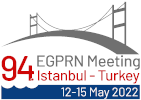Factors Affecting Cognitive Functions In Elderly People
Erva Ucuncu, Seçil Arica
Keywords: dementia, elderly, cognitive impairment, montreal cognitive assessment scale
Background:
The aim of our study is to draw attention to the minority elderly population and to try to determine the factors affecting cognitive functions in these individuals. Because we know that; not every cognitive disorder is Alzheimer disease, but there are also reversible types of dementia (depression, hypothyroidism, B12 deficiency, etc.). Our main goal is to identify these patients who can be easily diagnosed and treated by family physicians. It is also very important to follow up individuals who may be at risk for dementia more frequently and to referral to the specialist when necessary.
Research questions:
Can GPs recognize the early symptoms of dementia?
Is dementia underdiagnosed?
How often is reversible dementia at elderly population?
Method:
190 people, 106 females and 84 males, between the ages of 65-91 from a training health center in İstanbul were included in the study. We used a questionnare which assessed sociodemographics, medical history, Montreal Cognitive Assessment Scale (MoCA), Geriatric Depression Scale and yearly routine blood tests (glucose, TSH, T4, B12, folic asid, hemogram, HbA1c, ferritin etc.). Geriatric Depression Scale consists of 30 yes-no questions based on self-reporting and easy for elderly people. As result 0-10 point is "no depression" and total score is 30 points.The Montreal Cognitive Assessment scale was designed as a quick screening instrument for evaluation of mild cognitive dysfunctions. The maximum number of scores in test is 30; the result of 21 or more scores is consideres as normal. We investigated the potential factors of cognitive impairment.
Results:
Results will be available at the congress.
Conclusions:
Ongoing research.
Points for discussion:
What national guidelines do other countries have for early detection of dementia in elderly?
Is the Montreal Cognitive Assessment Scale (MoCA) suitable for mild cognitive impairment detection among people aged over 65?

